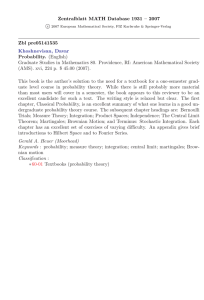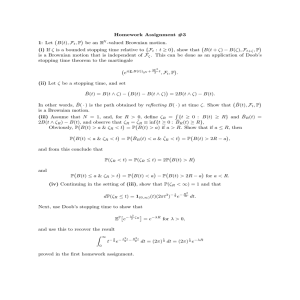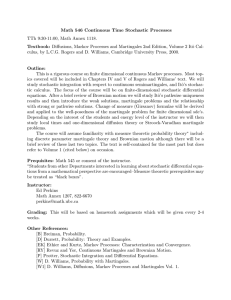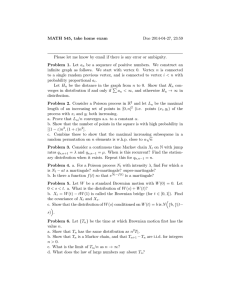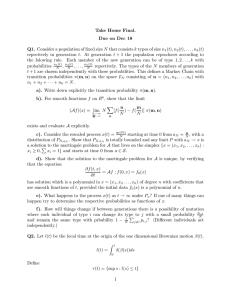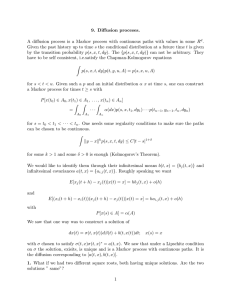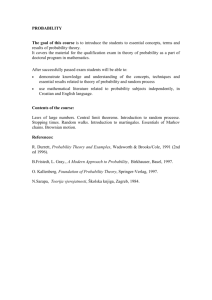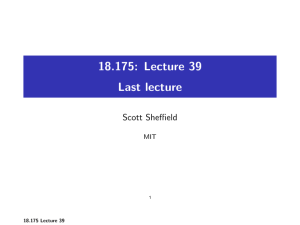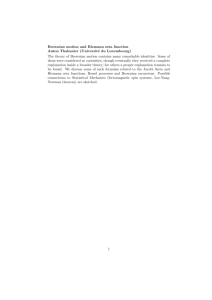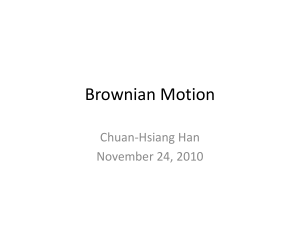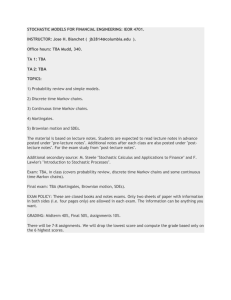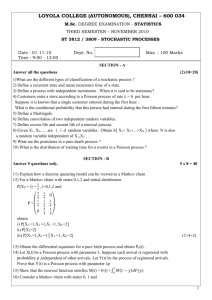Math 136: Stochastic Processes, Final Review
advertisement
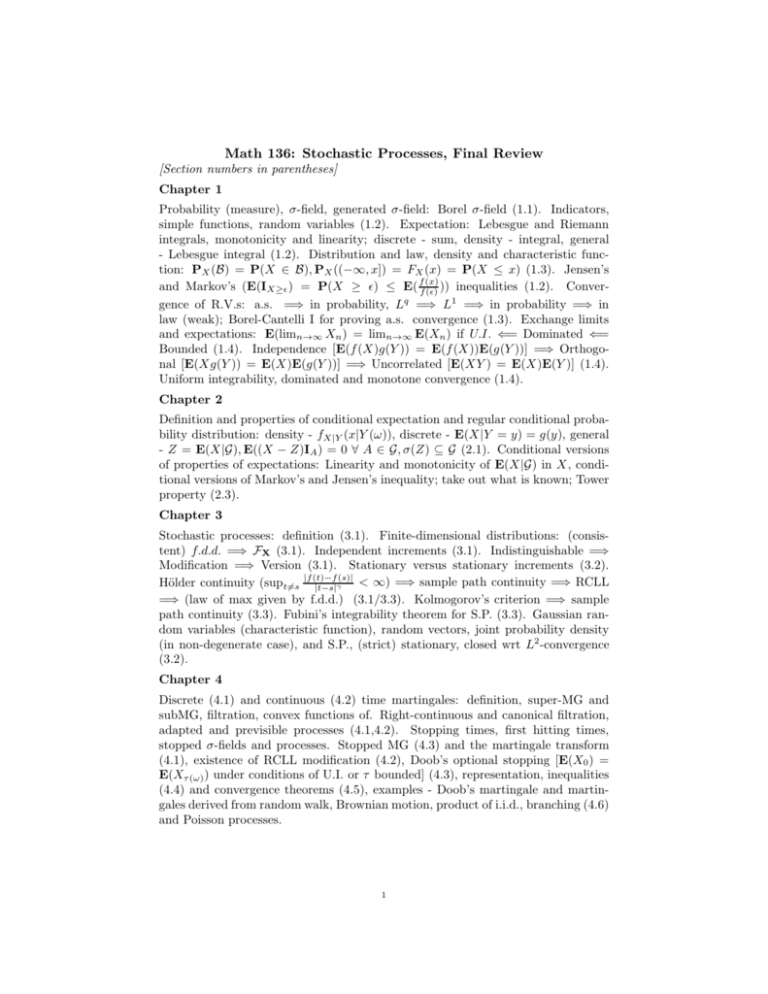
Math 136: Stochastic Processes, Final Review [Section numbers in parentheses] Chapter 1 Probability (measure), σ-field, generated σ-field: Borel σ-field (1.1). Indicators, simple functions, random variables (1.2). Expectation: Lebesgue and Riemann integrals, monotonicity and linearity; discrete - sum, density - integral, general - Lebesgue integral (1.2). Distribution and law, density and characteristic function: PX (B) = P(X ∈ B), PX ((−∞, x]) = FX (x) = P(X ≤ x) (1.3). Jensen’s and Markov’s (E(IX≥ǫ ) = P(X ≥ ǫ) ≤ E( ff(x) (ǫ) )) inequalities (1.2). Converq gence of R.V.s: a.s. =⇒ in probability, L =⇒ L1 =⇒ in probability =⇒ in law (weak); Borel-Cantelli I for proving a.s. convergence (1.3). Exchange limits and expectations: E(limn→∞ Xn ) = limn→∞ E(Xn ) if U.I. ⇐= Dominated ⇐= Bounded (1.4). Independence [E(f (X)g(Y )) = E(f (X))E(g(Y ))] =⇒ Orthogonal [E(Xg(Y )) = E(X)E(g(Y ))] =⇒ Uncorrelated [E(XY ) = E(X)E(Y )] (1.4). Uniform integrability, dominated and monotone convergence (1.4). Chapter 2 Definition and properties of conditional expectation and regular conditional probability distribution: density - fX|Y (x|Y (ω)), discrete - E(X|Y = y) = g(y), general - Z = E(X|G), E((X − Z)IA ) = 0 ∀ A ∈ G, σ(Z) ⊆ G (2.1). Conditional versions of properties of expectations: Linearity and monotonicity of E(X|G) in X, conditional versions of Markov’s and Jensen’s inequality; take out what is known; Tower property (2.3). Chapter 3 Stochastic processes: definition (3.1). Finite-dimensional distributions: (consistent) f.d.d. =⇒ FX (3.1). Independent increments (3.1). Indistinguishable =⇒ Modification =⇒ Version (3.1). Stationary versus stationary increments (3.2). (s)| < ∞) =⇒ sample path continuity =⇒ RCLL Hölder continuity (supt6=s |f (t)−f |t−s|γ =⇒ (law of max given by f.d.d.) (3.1/3.3). Kolmogorov’s criterion =⇒ sample path continuity (3.3). Fubini’s integrability theorem for S.P. (3.3). Gaussian random variables (characteristic function), random vectors, joint probability density (in non-degenerate case), and S.P., (strict) stationary, closed wrt L2 -convergence (3.2). Chapter 4 Discrete (4.1) and continuous (4.2) time martingales: definition, super-MG and subMG, filtration, convex functions of. Right-continuous and canonical filtration, adapted and previsible processes (4.1,4.2). Stopping times, first hitting times, stopped σ-fields and processes. Stopped MG (4.3) and the martingale transform (4.1), existence of RCLL modification (4.2), Doob’s optional stopping [E(X0 ) = E(Xτ (ω) ) under conditions of U.I. or τ bounded] (4.3), representation, inequalities (4.4) and convergence theorems (4.5), examples - Doob’s martingale and martingales derived from random walk, Brownian motion, product of i.i.d., branching (4.6) and Poisson processes. 1 2 Chapter 5 Brownian motion: definition, Gaussian construction, limit of random walk. independent increments of zero mean =⇒ MG, stationary independent increments =⇒ Strong Markov process, sample path Hölder continuous, index < 21 (5.1). Scaling and time inversion, Levy’s martingale characterization, time changed Brownian motion, reflection principle, law of its maximum in an interval and first hitting time of positive levels (5.2). Modulus of continuity, non-monotone sample path, quadratic variation = increasing process and total variation (5.3). Related processes: Geometric Brownian motion, Brownian bridge, fractional Brownian motion, integrated Brownian motion and Ornstein-Uhlenbeck process (5.1, 5.2). Chapter 6 Markov chains and processes: homogeneous, Markov and strong Markov property, Chapman-Kolmogorov, initial distribution, regular and stationary transition probabilities =⇒ f.d.d., invariance properties, examples (6.1). Poisson distribution, approximation, and process: definition, counting process, rate, construction, independence of increments, related martingales, memoryless property of the Exponential law, merging and thinning, the dual process of independent Exponential inter-arrivals, the order statistics of independent uniform samples (6.2).
